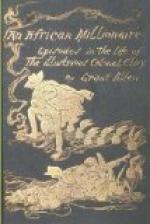He waved us to seats. We sat down. He spoke to us in French; his English, he remarked, with a pleasant smile, being a négligeable quantity. We might speak it, he went on; he could understand pretty well; but he preferred to answer, if we would allow him, in French or German.
“French,” Charles replied, and the negotiation continued thenceforth in that language. It is the only one, save English and his ancestral Dutch, with which my brother-in-law possesses even a nodding acquaintance.
We praised the beautiful scene. The Count’s face lighted up with patriotic pride. Yes; it was beautiful, beautiful, his own green Tyrol. He was proud of it and attached to it. But he could endure to sell this place, the home of his fathers, because he had a finer in the Salzkammergut, and a pied-à-terre near Innsbruck. For Tyrol lacked just one joy—the sea. He was a passionate yachtsman. For that he had resolved to sell this estate; after all, three country houses, a ship, and a mansion in Vienna, are more than one man can comfortably inhabit.
“Exactly,” Charles answered. “If I can come to terms with you about this charming estate I shall sell my own castle in the Scotch Highlands.” And he tried to look like a proud Scotch chief who harangues his clansmen.
Then they got to business. The Count was a delightful man to do business with. His manners were perfect. While we were talking to him, a surly person, a steward or bailiff, or something of the sort, came into the room unexpectedly and addressed him in German, which none of us understand. We were impressed by the singular urbanity and benignity of the nobleman’s demeanour towards this sullen dependant. He evidently explained to the fellow what sort of people we were, and remonstrated with him in a very gentle way for interrupting us. The steward understood, and clearly regretted his insolent air; for after a few sentences he went out, and as he did so he bowed and made protestations of polite regard in his own language. The Count turned to us and smiled. “Our people,” he said, “are like your own Scotch peasants—kind-hearted, picturesque, free, musical, poetic, but wanting, hélas, in polish to strangers.” He was certainly an exception, if he described them aright; for he made us feel at home from the moment we entered.
He named his price in frank terms. His lawyers at Meran held the needful documents, and would arrange the negotiations in detail with us. It was a stiff sum, I must say—an extremely stiff sum; but no doubt he was charging us a fancy price for a fancy castle. “He will come down in time,” Charles said. “The sum first named in all these transactions is invariably a feeler. They know I’m a millionaire; and people always imagine millionaires are positively made of money.”
I may add that people always imagine it must be easier to squeeze money out of millionaires than out of other people—which is the reverse of the truth, or how could they ever have amassed their millions? Instead of oozing gold as a tree oozes gum, they mop it up like blotting-paper, and seldom give it out again.




